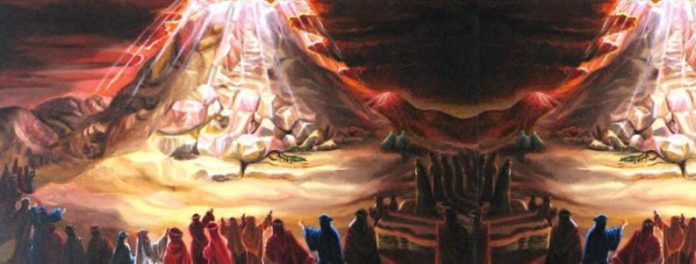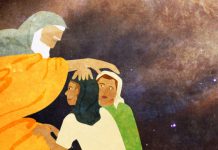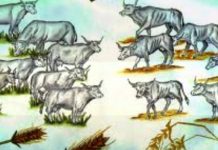The Census and the Tabernacle: Unity through Contribution
Parshat Ki Tisa begins with a commandment to take a census of the people, where everyone had to give one half-shekel of silver to build the Tabernacle. However, it is forbidden by Jewish law to count heads, so everyone contributes coins, and we count those instead. The worth of the shekel was 20 “Gaira,” and even though each person contributed their maximum effort, it still only made up one-half, and they needed the teamwork of the entire nation to make a whole.
The Golden Calf: Misinterpretation and Idolatry
The Parsha then details the account of the Golden Calf. Moses had gone up on Mount Sinai, and when he did not return on the expected day, the people counted that day, and due to their miscalculation, thought he did not come down on time. The “Satan” showed the people a vision of Moses in a coffin flying to heaven. The people, nervous about his absence, demanded that Aaron provide a substitute for Moses. Aaron, having witnessed the murder of Chur, agreed and began creating the Golden Calf all by himself to stall for time until Moses arrived. The people woke up early and were negatively influenced by the “mixed multitude” of Egyptian converts who quickly reverted to their idolatrous heritage. The tribe of Levi did not worship the calf at all.
Moses and the Tablets: Shock Treatment and Intellectual Discussions
During all this, Moses was up on the mountain receiving the tablets of the Ten Commandments. Then God told him to go down immediately: “Your people have messed up!” Moses came down with the stone tablets, and when confronted with the Golden Calf, he threw them down, shattering them at the base of the mountain. Moses figured that the people made an intellectual mistake, in somehow thinking this calf was a god. “If I take the tablets and show them the truth, we can have an intellectual discussion (a ‘Discovery Seminar!’), and I will show them the truth.” However, when Moses saw them dancing in front of the calf, emotionally involved, there was no other way except “shock treatment” to make them come to their senses.
The Sin of the Golden Calf: Subordinating Intellect to God’s Will
The Jewish people are the descendants of Abraham, Isaac, and Jacob who knew God and were in contact with Him. They conveyed to their children the basic concepts of how the Almighty wants humanity to live. They were only missing the details. Until the revelation at Sinai, they would use their genius intellect and determine the will of God in every situation. This method was fine until Sinai. Once they heard Divine revelation, they now had to subordinate their intellect to the higher intelligence of God. This, in essence, was the sin of the Golden Calf. The Jews knew they needed a tangible representation of the Divine in their midst. This in essence, was the Tabernacle. However, there is a difference. When God commands you to build an edifice that He will sanctify with His presence, that is a Tabernacle. When man decides to bring God down to him, that is idolatry.
Parshat Ki Tisa teaches us about the importance of unity and the dangers of idolatry. The Jewish people were lifted up to be counted as part of the Jewish nation, and they had to work together as a team to make a whole. The sin of the Golden Calf teaches us that we cannot bring God down to us; rather, we must elevate ourselves to God’s level by following His commandments and living according to His will.
The Importance of Leadership
One of the most significant lessons we can learn from Parshat Ki Tisa is the importance of leadership. The Jewish people were lost without Moses, their leader, and in his absence, they made a grave mistake. Aaron, who was left in charge, was not able to fill Moses’ shoes adequately. When Moses came down from the mountain, he saw that the people had turned to idolatry, and he immediately took action to correct their mistake.
This highlights the crucial role that leaders play in guiding their followers in the right direction. It also emphasizes the responsibility that leaders have to ensure that their followers do not stray from the path of righteousness. Moses was an excellent leader who was dedicated to his people and his mission. He was willing to risk everything to ensure that his people did not stray from the path of righteousness.
The Dangers of Emotions
The sin of the Golden Calf also teaches us about the dangers of giving in to our emotions. The Jewish people were fearful and uncertain in Moses’ absence, and they allowed their emotions to get the better of them. They turned to idolatry, which was a grave mistake that had severe consequences. This teaches us that we must learn to control our emotions and not allow them to dictate our actions.
Repentance and Forgiveness
Furthermore, Parshat Ki Tisa teaches us about the importance of repentance and forgiveness. Despite the Jewish people’s grave mistake, God forgave them and gave them another chance. This teaches us that no matter how far we may have strayed from the path of righteousness, we can always repent and turn back to God.
In conclusion, Parshat Ki Tisa teaches us about the importance of unity, leadership, controlling our emotions, repentance, and forgiveness. It is a powerful reminder of the pitfalls that we must avoid in our journey towards righteousness and the virtues that we must cultivate to stay on the right path.














